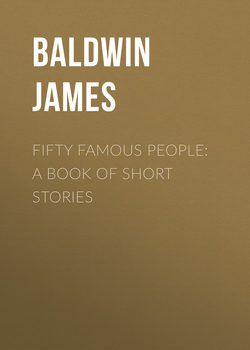Читать книгу Fifty Famous People: A Book of Short Stories - Baldwin James - Страница 5
THE ETTRICK SHEPHERD
ОглавлениеI
In Scotland there once lived a poor shepherd whose name was James Hogg. His father and grandfather and great-grandfather had all been shepherds.
It was his business to take care of the sheep which belonged to a rich landholder by the Ettrick Water. Sometimes he had several hundreds of lambs to look after. He drove these to the pastures on the hills and watched them day after day while they fed on the short green grass.
He had a dog which he called Sirrah. This dog helped him watch the sheep. He would drive them from place to place as his master wished. Sometimes he would take care of the whole flock while the shepherd was resting or eating his dinner.
One dark night James Hogg was on the hilltop with a flock of seven hundred lambs. Sirrah was with him. Suddenly a storm came up. There was thunder and lightning; the wind blew hard; the rain poured.
The poor lambs were frightened. The shepherd and his dog could not keep them together. Some of them ran towards the east, some towards the west, and some towards the south.
The shepherd soon lost sight of them in the darkness. With his lighted lantern in his hand, he went up and down the rough hills calling for his lambs.
Two or three other shepherds joined him in the search. All night long they sought for the lambs.
Morning came and still they sought. They looked, as they thought, in every place where the lambs might have taken shelter.
At last James Hogg said, "It's of no use; all we can do is to go home and tell the master that we have lost his whole flock."
They had walked a mile or two towards home, when they came to the edge of a narrow and deep ravine. They looked down, and at the bottom they saw some lambs huddled together among the rocks. And there was Sirrah standing guard over them and looking all around for help "These must be the lambs that rushed off towards the south," said James Hogg.
The men hurried down and soon saw that the flock was a large one.
"I really believe they are all here," said one.
They counted them and were surprised to find that not one lamb of the great flock of seven hundred was missing.
How had Sirrah managed to get the three scattered divisions together? How had he managed to drive all the frightened little animals into this place of safety?
Nobody could answer these questions. But there was no shepherd in Scotland that could have done better than Sirrah did that night.
Long afterward James Hogg said, "I never felt so grateful to any creature below the sun as I did to Sirrah that morning."
II
When James Hogg was a boy, his parents were too poor to send him to school. By some means, however, he learned to read; and after that he loved nothing so much as a good book.
There were no libraries near him, and it was hard for him to get books. But he was anxious to learn. Whenever he could buy or borrow a volume of prose or verse he carried it with him until he had read it through. While watching his flocks, he spent much of his time in reading. He loved poetry and soon began to write poems of his own. These poems were read and admired by many people.
The name of James Hogg became known all over Scotland. He was often called the Ettrick Shepherd, because he was the keeper of sheep near the Ettrick Water.
Many of his poems are still read and loved by children as well as by grown up men and women. Here is one:—
A BOY'S SONG
Where the pools are bright and deep,
Where the gray trout lies asleep,
Up the river and o'er the lea,
That's the way for Billy and me.
Where the blackbird sings the latest,
Where the hawthorn blooms the sweetest,
Where the nestlings chirp and flee,
That's the way for Billy and me.
Where the mowers mow the cleanest,
Where the hay lies thick and greenest,
There to trace the homeward bee,
That's the way for Billy and me.
Where the hazel bank is steepest,
Where the shadow falls the deepest,
Where the clustering nuts fall free,
That's the way for Billy and me.
Why the boys should drive away,
Little maidens from their play,
Or love to banter and fight so well,
That's the thing I never could tell.
But this I know, I love to play
In the meadow, among the hay—
Up the water, and o'er the lea,
That's the way for Billy and me.
